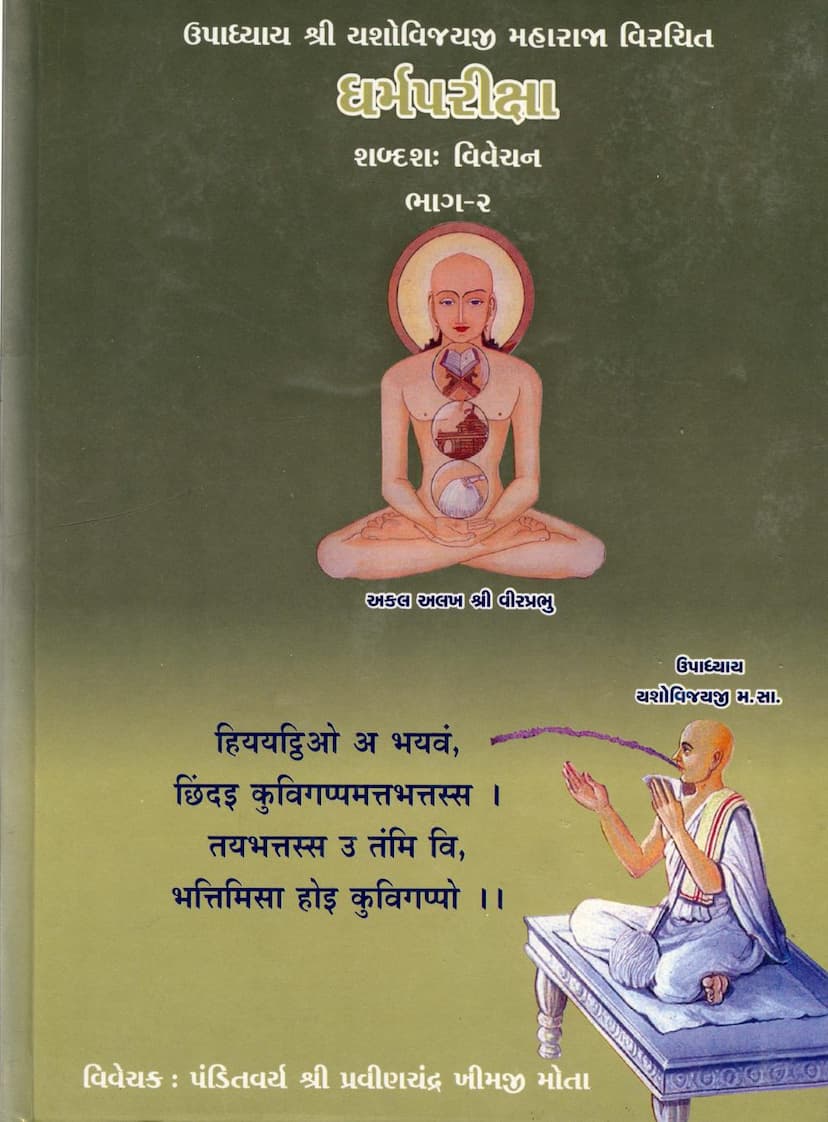Dharm Pariksha Part 02
Added to library: September 1, 2025

Summary
Here is a comprehensive summary of the provided Jain text, "Dharm Pariksha Part 02," based on the translated content:
Book Title: Dharm Pariksha Part 02 Author: Yashovijay Upadhyay (Original Text), Pandit Praveenchandra Khimji Mota (Commentary/Vivechan) Publisher: Gitarth Ganga Catalog Link: https://jainqq.org/explore/022181/1
This volume, "Dharm Pariksha Shabdasha Vivechan Bhag-02," is a detailed commentary on the original work by Acharya Shri Yashovijayji Maharaja. It is presented with the blessings of Acharya Shri Vijay Ramchandrasurishwarji Maharaja and his disciples, and the commentary is provided by Pandit Praveenchandra Khimji Mota. The compilation is done by P.P. Muniraj Shri Yogjitvijayji M.Sa. The Gitarth Ganga Trust is the publisher.
Core Theme and Purpose:
The book emphasizes the importance of Dharm Pariksha (examination of Dharma) performed with madhyasthata (impartiality or neutrality). This impartial examination leads to märgānusārī buddhi (intelligence that follows the righteous path), which in turn fosters samyagdarshan (right faith) and refines it further. Volume 1 likely explained the methodology of examining scriptures, while Volume 2 delves into specific philosophical points.
Key Topics and Arguments in Volume 2 (as indicated by the index and content):
- Praise of Common Qualities: The text discusses the proper method of praising common virtues found in both worldly (laukik) and transcendental (lokottar) contexts.
- Critique of Dogmatism: It addresses the erroneous view that the virtues of those with incorrect views (mithyādr̥ṣṭi) should not be accepted or praised. The author argues, using scripture (Gāthā 36), that this is a misstatement (dusvachana). True impartiality is achieved by approving valid teachings that align with Jinavachan (the teachings of the Jinas) even if found in other philosophies, especially when they support the path to liberation.
- Anumodanā (Approval/Endorsement) of Virtues: The text explores the concept of anumodanā (approval) of virtues found in others, even if they are not fully aligned with Jain principles (like those in mithyādr̥ṣṭi). It clarifies that approving the righteous aspects does not lead to samādhi atyācāra (transgressions of right faith) and establishes that even those with lesser virtues (compared to the samyagdaṣṭi) can have their commendable qualities endorsed.
- The Case of Marichi and Jamali: The commentary includes a detailed discussion of the examples of Marichi and Jamali, who are cited in Jain scriptures concerning usūtra bhāṣaṇa (speaking that which is contrary to scripture) and its dire consequences, leading to immense suffering and prolonged cycles of rebirth. The author analyzes scriptural interpretations regarding Jamali's usūtra bhāṣaṇa with impartiality.
- The True Nature of Faith and Doctrine: The text emphasizes that impartiality in examining scriptures leads to the presence of the Lord (God) in one's heart, fostering the development of right intelligence to understand and propagate the pure path.
- The Philosophy of Kevalis (Omniscient Beings): A significant portion of the commentary is dedicated to discussing the nature of Kevalis. It addresses the question of whether Kevalis's physical actions (dravya yoga) can cause harm to living beings.
- It argues that while Kevalis's actions are subtle, they do not lead to karmic bondage (karma bandha) due to their apramatta (non-negligent) state.
- It clarifies that the intention (adhyavasāya) plays a crucial role in karmic bondage, even when actions are similar.
- The text engages with different interpretations of scriptural verses concerning Kevalis and violence (himsa), particularly regarding the concept of dravya himsa and its relation to bhāva himsa (mental himsa). It explains that Kevalis do not experience bhāva himsa due to their liberation from passions, but the subtle physical actions (dravya yoga) may lead to apparent harm to living beings, though without karmic consequence for the Kevali.
- Karmic Bondage and Intention: The commentary highlights the significance of intention (adhyavasāya) versus action (kriyā) in determining karmic consequences. It is argued that even if a pramatta (negligent) monk's actions cause harm, they do not accrue karmic bondage if performed without negligence. Conversely, a non-negligent being might still incur karmic bondage if their intention is unfavorable, even without outward harm.
- The Role of Adhyavasāya (Mental State): The text stresses that the mental state (adhyavasāya) is paramount in karmic bondage, and actions are secondary in determining the karmic outcome.
- Reconciliation of Scriptural Apparent Contradictions: The commentary aims to resolve apparent contradictions within scriptures by providing a nuanced interpretation, emphasizing the role of impartiality (madhyasthata) in understanding the true meaning.
- Acceptance of Teachings from Other Philosophies: The text supports the idea of appreciating and integrating valid principles from other philosophical schools, provided they do not contradict the core tenets of Jainism. This reflects a tolerant and inclusive approach to Dharma.
- Critique of Extremism: It warns against extreme views and rigid adherence to dogma (kadāgraha), advocating for a balanced and reasoned approach to understanding Dharma.
- The Nature of Kevalis's Actions: The discussion on Kevalis explains that their actions, even those that might appear to cause harm to subtle beings, are not driven by passions or intent to harm. Their actions are described as being beyond worldly cause-and-effect (kāraṇa-kāraṇa) and are ultimately aimed at the well-being of all souls, albeit in ways that are difficult for non-omniscient beings to comprehend.
Overall Impact:
The commentary aims to provide a profound and clear understanding of the principles of Dharma Pariksha. It encourages readers to engage with spiritual texts with critical thinking, impartiality, and a deep respect for the Lord's teachings, leading to the realization of true well-being and liberation. The book meticulously analyzes complex philosophical points, presenting them in a systematic and accessible manner through detailed explanations of each verse and its underlying context.